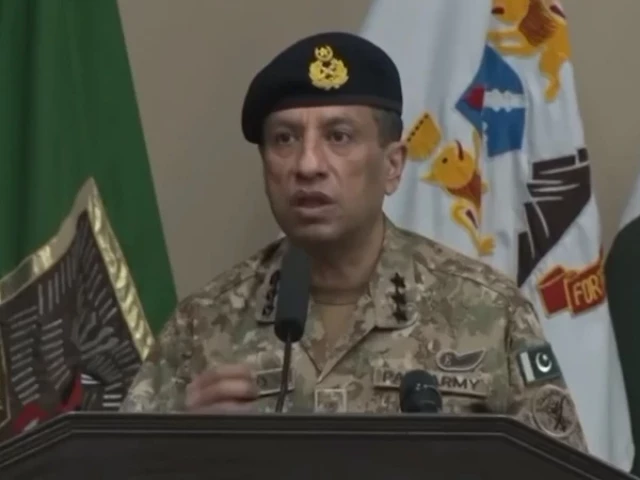Discusses Pak-Afghan tensions, says Pakistan takes effective measures against terrorism
Director General of Inter-Services Public Relations (DG ISPR) Lieutenant General Ahmed Sharif Chaudhry has reaffirmed the Pakistan Army’s commitment to the defense of the nation, warning that any external aggression would be met with a strong and decisive response.
During an interactive session with teachers and students from various universities in Abbottabad, Lt General Chaudhry discussed the tensions between Pakistan and Afghanistan and the security situation in the country. He said Pakistan had taken effective measures against terrorism.
Khyber-Pakhtunkhwa has been at the forefront of Pakistan’s anti-terrorism campaign for two decades. When terrorist incidents increased again in 2021, security forces launched a strong and effective response, killing more Khawarij in recent months than in the previous nine years combined.
Read: Field Marshal Asim Munir vows to rid KP of terrorists, accomplices
There is a growing nexus between terrorism and crime that has allowed lawlessness to flourish, especially in KP and Balochistan – Pakistan’s key battlegrounds against terrorism.
Fitna al-Khwarij is a term the state coined to refer to terrorists affiliated with the banned Tehreek-e-Taliban Pakistan (TTP) after the war with India in May this year.
On the other hand, tensions between Pakistan and Afghanistan have sharply intensified following deadly cross-border clashes. According to the Inter-Services Public Relations (ISPR), Afghan Taliban forces, allegedly supported by “Indian-sponsored elements”, launched an unprovoked attack on Pakistani border posts on the night of October 11-12.
In retaliation, Pakistani security forces carried out precision strikes, killing more than 200 Afghan fighters and destroying several Taliban posts and terrorist camps. The clash left 23 Pakistani soldiers martyred. Islamabad has accused Kabul of allowing its territory to be used for terrorist purposes, while the Taliban administration has denied the allegations, saying it acted in self-defense.
Teachers and students paid tribute to the martyrs and veterans of the armed forces. Hazara University Vice-Chancellor Dr Ikramullah Khan called the Pakistan Army a “true symbol of love for the motherland”, saying the nation stood with its soldiers.
Participants noted that hostile elements attempt to mislead young people, emphasizing the need to provide them with accurate information.
The students expressed pride in institutions like the Pakistan Army that guide and support the youth. “Today we learned the truth about the false rumors being spread on social media against the Pakistan Army,” said a student.
Earlier this month, during a press conference in Peshawar, Lt Gen Chaudhry blamed the recent rise in terrorism on weak governance and poor implementation of the National Action Plan (NAP), particularly in Khyber-Pakhtunkhwa (KP), where “around 70 per cent of the country’s terrorist acts take place”.
Learn more: Pakistan to participate in Moscow format talks on Afghanistan
Lt Gen Chaudhry revisited the revised points of the NAP 2021 – calling for intolerance towards militancy, curbing terrorism financing and propaganda, capacity building of counter-terrorism departments, regulation of seminaries and criminal justice reforms.
Formulated after the Army Public School attack with cross-party consensus, the 14 points of the NAP, he said, are not being properly implemented. “All parties agreed on this, but is this being implemented? » he asked.
Without naming any political party, the DG ISPR attributes the deterioration of the security situation in KP to internal failures. “The provincial government has fallen into a nexus between terrorism and crime,” he said, citing narcotics smuggling and unpaid vehicle trading as factors promoting lawlessness.
“When the suggestion was made to seal the Pak-Afghan border, some in power opposed it to protect their criminal activities,” he added. “Terrorism exists today because we are not following the National Action Plan. »




